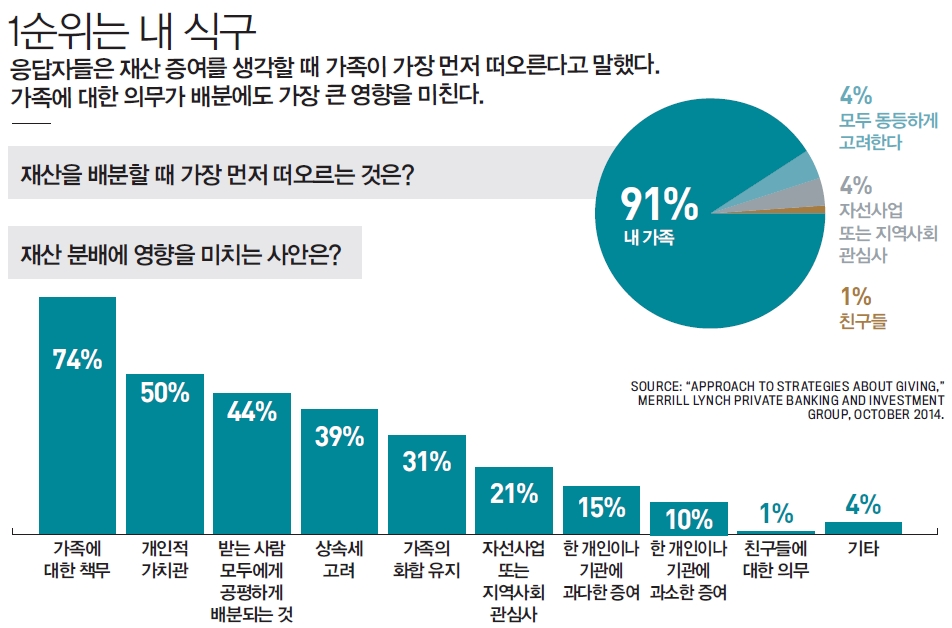- 미우나 고우나 유산은 ‘가족’에게

HOW MUCH SHOULD PARENTS LEAVE THEIR KIDS
A new survey of high-net-worth individuals, or those who have a minimum of $5 million in assets, by Merrill Lynch’s Private Banking and Investment Group details key habits and considerations when it comes to passing money to their children. The group surveyed 206 of these individuals, all of whom had at least one child and intended to pass some of that wealth to their children.
Of the respondents, 91 percent said family was a priority when it came to handing down money. Only 4 percent said that philanthropic groups came to mind first. Commitment to family was the biggest influence on these decisions, more than personal values, estate taxes and other considerations.
“Our intention is to help wealth creators and wealth holders to put more thought and purpose toward their giving goals,” the report declared. It acknowledged that the media often painted wealthy heirs and heiresses in varying shades of narcissism, wastefulness or downright ridiculousness. It also sought to dispel any wariness about inheritance that might stem from such negative attention. “Our research on giving and sustaining wealth is aimed at moving beyond superficial assumptions,” it noted.
Wherever the money ultimately ends up, preserving as much of the original amount was a priority for most respondents in the survey. “I will do as much as possible within the rules to minimize the taxes,” 86 percent said, while only 13 percent answered that they believed it was “reasonable” to contribute their “fair share” in taxes.
“With any giving, there’s both a desire to benefit the next generation and a need to be practical,” the report noted. Translation: Minimize estate taxes, which apply after an individual dies. According to the report, 58 percent of those with at least $10 million in assets were planning on distributing wealth to their children before rather than after they died, a move that can offer potential tax benefits.
But could giving too much money leave children coddled or perhaps foster laziness? Some wealthy individuals seemed to fear so. Although their purpose in giving was mainly to allow their heirs and heiresses to pursue their dreams, some expressed concern that giving too much could prevent recipients from reaching their full potential.
For wealthy individuals, the challenge then becomes finding that sweet spot. On average, families with $100 million said giving $63 million was “too much” for one child, although $26 million was considered “too little.” However, the report also added, “When it comes to how much is too much, it appears that there may be no one-size-fits-all answer.”
The final decision may end up being a unilateral one, as roughly one-third of survey respondents said they didn’t discuss the issue of inheritance with their families due to fears “the conversation will disrupt family harmony.”
Awkward or not, more families may have to swallow their squeamishness and initiate those difficult conversations, if they don’t want their hard-earned millions to potentially be squandered (or, horrors, lost to taxes). From 2007 to 2061, about $59 trillion will be handed down in inheritances, according to a report by the Center on Wealth and Philanthropy.

미우나 고우나 유산은 ‘가족’에게
메릴린치 자산관리·투자그룹이 실시한 조사는 재산을 자녀에게 물려줄 때 부자들이 갖는 주된 습관과 고려사항을 잘 보여준다. 한 자녀 이상을 뒀으며 그들에게 재산 일부를 물려줄 생각을 가진 500만 달러(약 55억원) 이상의 미국 자산가 206명을 대상으로 한 설문조사다.
응답자 중 91%는 재산을 증여할 때 가족이 최우선이라고 말했다. 자선단체가 먼저 떠오른다는 응답자는 4%에 불과했다. 이런 결정에는 개인적 가치관, 상속세 등의 다른 고려사항보다 가족에 대한 책무가 가장 큰 영향을 미쳤다.
메릴린치의 보고서는 “부 창출자와 소유자가 재산 증여와 관련해 더 깊이 생각하고 목적을 부여하는데 도움을 줄 목적으로 조사를 실시했다”고 의도를 설명했다. 또 미디어에는 부잣집 상속인이 자아도취나 낭비벽이 심하고 사회적 의식이 없다는 식으로 묘사되는 경우가 많다고 지적했다. 그런 부정적인 시각에서 비롯되는 상속의 경계심을 완화하는 것도 이번 조사의 목적이라고 밝혔다. “재산을 물려주고 유지하는 문제에 관한 우리의 조사는 피상적인 추정을 뛰어넘는 것을 목표로 한다.”
응답자의 대다수가 가장 중시하는 점은 궁극적으로 재산을 누구에게 증여하든 간에 원래의 재산을 최대한 보존하는 것으로 나타났다. 예를 들어 86%는 “합법적인 절세를 위해 최대한 노력하겠다”고 말했다. 세금으로 ‘정당한 몫’을 내는 게 ‘합리적’이라고 말한 사람은 13%에 불과했다.
“어떤 증여든 다음 세대에 혜택을 주고 싶은 욕구와 실용성을 추구하고 싶은 욕구 둘 다가 있다”고 보고서는 지적했다. 다시 말해 부모 사망 후 적용되는 상속세를 최소화하려는 마음가짐을 말한다. 보고서에 따르면 1000만 달러 이상의 자산가 중 58%는 생전에 자녀에게 재산을 나눠줄 생각이었다. 미국에선 그럴 경우 세금을 줄일 수 있기 때문이다.
그러나 생전에 많은 재산을 넘겨주면 자녀가 방탕하거나 게으름뱅이가 되지 않을까? 일부는 그런 점을 우려했다. 재산 증여의 주된 목적이 자녀가 꿈을 추구하고 실현할 수 있도록 도움을 주는 것이지만 일부는 돈을 너무 많이 줄 경우 자녀가 잠재력을 완전히 발휘하지 못할 가능성을 우려했다.
따라서 부자는 적절한 상속 액수를 알아야 한다. 평균적으로 재산 1억 달러를 가진 가정은 자녀 1명에게 6300만 달러를 주면 “과하다”, 2600만 달러를 주면 “너무 적다”고 말했다. 그러나 보고서는 “모두에게 적용되는 적절한 액수는 없다”고 덧붙였다.
최종 결정은 개인의 몫이다. 조사 응답자의 약 3분의 1은 상속문제를 가족과 의논하지 않는다고 말했다. “그런 대화가 가족의 화합을 깰 수 있다”는 우려 때문이다.
어렵게 모은 재산이 낭비되거나 세금 폭탄을 피하려면 아무리 거북해도 그 어려운 대화를 시작해야 한다. 재산·자선센터에 따르면 2007~2061년 미국에선 약 59조 달러가 자녀에게 증여될 것으로 추정된다.
- 번역 이원기
ⓒ이코노미스트(https://economist.co.kr) '내일을 위한 경제뉴스 이코노미스트' 무단 전재 및 재배포 금지










![면봉 개수 → 오겜2 참가자 세기.. 최도전, 정직해서 재밌다 [김지혜의 ★튜브]](https://image.isplus.com/data/isp/image/2025/12/21/isp20251221000019.400.0.jpg)
![갓 잡은 갈치를 입속에... 현대판 ‘나는 자연인이다’ 준아 [김지혜의 ★튜브]](https://image.isplus.com/data/isp/image/2025/11/21/isp20251121000010.400.0.jpg)



당신이 좋아할 만한 기사
브랜드 미디어
브랜드 미디어
금값·은값에 이어 백금 가격도 사상 최고치
세상을 올바르게,세상을 따뜻하게일간스포츠
일간스포츠
일간스포츠
현직 세무사 “박나래, 엄마 ·전 남친에 준 급여… 횡령 소지 있어” [왓IS]
대한민국 스포츠·연예의 살아있는 역사 일간스포츠일간스포츠
일간스포츠
일간스포츠
석화 구조개편 본격화에도…업계 “버틸 체력 부족” 우려
세상을 올바르게,세상을 따뜻하게이데일리
이데일리
이데일리
[마켓인]‘1.7% 격차’ 좁힌 고려아연…MBK·영풍, 남은 5일 시나리오는
성공 투자의 동반자마켓인
마켓인
마켓인
'플루빅토 독점 구조 흔들까'…효능·부작용 앞세운 셀비온, 5400억 정조준
바이오 성공 투자, 1%를 위한 길라잡이팜이데일리
팜이데일리
팜이데일리